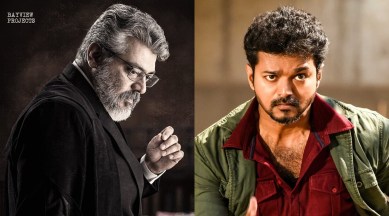Click here to follow Screen Digital on YouTube and stay updated with the latest from the world of cinema.

Vijay turns a year older today. He is 45 now. And it seems like the right occasion to peg a write up on why he should start doing better films. Not to be confused with rich visual style, the big budget, massive sets, A-listers in supporting cast and leading technicians in the crew, which have always been an integral part of his movies. When I say better films, it means films that offer some value beyond nearly three hours of self-aggrandizing narrative, which is only disrupted by frequent musical numbers.
Later, Vijay bounced back with remakes: Kaavalan (2011), which was a remake of Malayalam film Bodyguard. Even as it showed Vijay taking on a professional Muay Thai fighter dressed in jeans and T-shirt, there was some subtlety to the film courtesy director Siddique. Comedian Vadivelu’s performance has a lion’s share in making the film likeable. He reprised Aamir Khan’s role from 3 Idiots in its Tamil remake Nanban (2012), which is easily the most gentle role he has played in his career. Barring Thalaivaa, a pretentious Godfather-esque film, he has tasted steady commercial success at the box office since.
But Vijay follows a very shallow definition of entertainment. He has only been making movies from let’s-go-and-save-them genre. Majority of his films begins with the same plotline: when the hero arrives in town and so it begins. Take his recent films, for example. In Thuppakki (2012), he arrives in Mumbai for a vacation and ends up saving the city from terrorism. In Kaththi (2014), he arrives in Chennai and saves poor farmers from corporate greed. In Sarkar, he returns home from America to vote in elections and saves Tamil Nadu from corrupt politicians. He has played a saviour in every conceivable way in nearly three decades of his acting career. And it’s about time he pays his debt to cinema, which has made him who he is today, by making better choices.
It would be foolhardy of me to expect to see Vijay in a film helmed by Shaji N. Karun. He is a star and the actor derives his value from his box office success, rather than the number of critics he made happy. But I only hope that he begins to make films that find a fine balance between art and entertainment like the works of Mani Ratnam, Shankar and Priyadarshan.
It comes down to Vijay’s personal choice to make a film of pure entertainment that is also rife with engrossing themes and interesting messages. We can only enjoy so much of Vijay questioning our moral conviction at press conference sequences in his films. Instead of preaching on mic, he should pick scripts that imbues the messages he wants to share in form of persistent themes.
For starters, Vijay should allow other characters in the film have some degree of prominence in moving the story forward. Especially, when it comes to female characters. They say, “A nation can be judged based on the way it treats its women.” In that context, the cinematic world of Vijay is significantly underdeveloped.
Of course, the actor has come a long way from Sivakasi (2005), in which he indulged in blatant misogyny by publicly shamming the character of Asin for her fashion choices. His dialogues even claim that men won’t bother women if they wrap themselves in saree.
Even as we don’t see such obnoxious opinions over the issue of women’s safety, seldom we see strong female characters in his films. In the last ten years, try to name one female character from a Vijay film that was worth keeping in your memory. Female characters in his films have only two purposes, more or less. Either they are there for his amusement or seek his protection forcing him into action.
Now, look at how women are represented in Ajith’s recent films. For instance, Yennai Arindhaal. When Ajith’s Sathyadev asks Trisha’s Hemanika to marry him, she sort of questions his motive. She asks him whether he wants to marry her to meet the approval of the society. In other words, she says he doesn’t have to marry her because they both are in conjugal relationship. Hemanika was a far cry from conventional heroines who represent old-fashioned notion of sex and marriage. It is not just a Gautham Menon thing. Even in his recent film Viswasam, Nayanthara comes across as a strong women as opposed to an arrogant lady, who needs to be taught a lesson on how to behave with her man. Ajith plays a humble husband burdened by guilt of letting his wife down. Instead of forcing his needs on her, he waits at her doorstep for her forgiveness. Siva might have written the relationship dynamics between seething wife and a guilt-ridden husband but they would not have made it to the screen without Ajith’s blessing.
In Nerkonda Paarvai, Ajith plays a character that defends a girl’s right to say ‘NO’. The film is a remake of Pink, whose basic premise is to challenge the patriarchal views of demonising women, who have sex before marriage. The female characters in Nerkonda Paarvai is far cry from female characters in Vijay’s, who always seems to have had no prior experience or interest in romantic relationships of any sort until they saw Vijay.
If Ajith can do it, why can’t Vijay?
Click here to follow Screen Digital on YouTube and stay updated with the latest from the world of cinema.